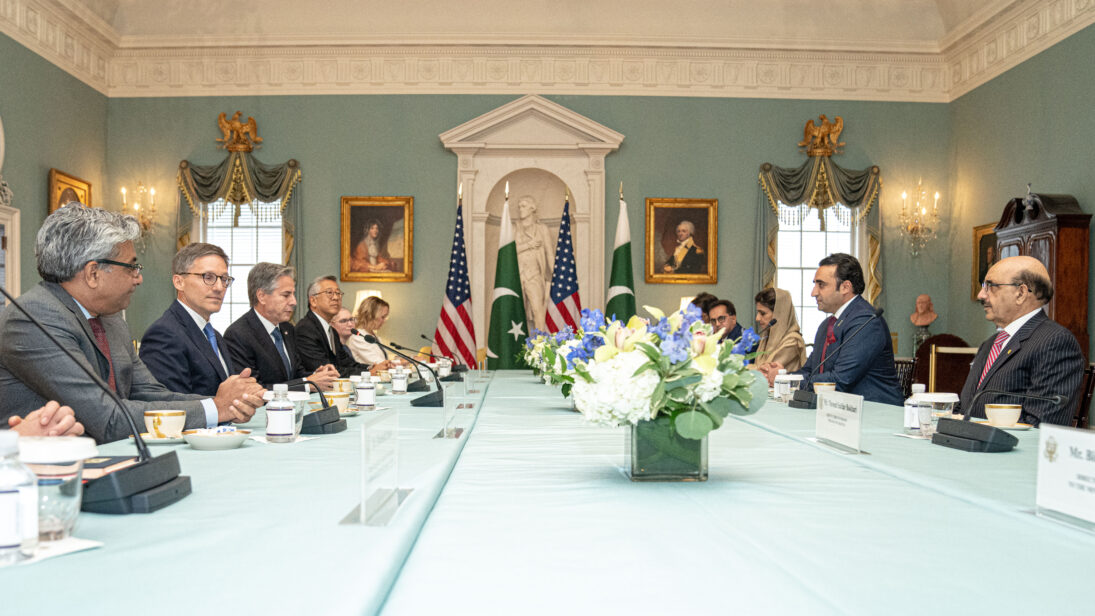
On September 29, the U.S. Embassy in Islamabad hosted a diplomatic reception to commemorate the 75th anniversary of bilateral relations between the United States and Pakistan.
To an audience of U.S. and Pakistani foreign diplomats – including chief guest Prime Minister Shehbaz Sharif – U.S. Ambassador to Pakistan, Donald Blome, delivered a key speech setting the tone for the future bilateral relationship between the U.S. and Pakistan. In his speech, Ambassador Blome focused on two key areas of the relationship: the relationship’s strong foundations and forging new partnership opportunities. Ambassador Blome also highlighted that the U.S.’ ties with Pakistan, previously overshadowed by its war in Afghanistan, should not hinge on the narrow prisms of India and China, emphasizing that the Pakistan-U.S. relationship must stand on its own.
However, Ambassador Blome’s emphasis on transforming the U.S.’ ties with Pakistan from a security-dominated partnership to a broad-based economic relationship remained the most compelling aspect of his speech. Both previous and current governments in Pakistan have publicly indicated their wish for a relationship centered around trade and investment with the United States. While uncertainties in Islamabad remain over the U.S. intentions for quickly transitioning its foreign policy to be more proactive in Pakistan, Pakistan and the United States should both prioritize retaining the momentum and defining outcomes from their cooperation.
From Resentment to Recuperation
Just a few weeks before Ambassador Blome’s speech, geopolitical differences between Washington and Islamabad mired the relationship, including discrepancies on the withdrawal from Afghanistan. Sentiments of anti-Americanism in Pakistan also compounded the distrust. Earlier in the year, government-to-government linkages remained at a standstill partly due to a lack of communication between former Pakistan Prime Minister Imran Khan and U.S. President Joe Biden.
While uncertainties in Islamabad remain over the U.S. intentions for quickly transitioning its foreign policy to be more proactive in Pakistan, Pakistan and the United States should both prioritize retaining the momentum and defining outcomes from their cooperation.
Nonetheless, in the aftermath of the catastrophic floods in Pakistan, the United States delivered more than $66 million to facilitate humanitarian responses and disaster resilience, which served as an indicator of the bilateral relationship’s renewed vigor. U.S. citizens, non-profits, and private companies contributed additional financial support for flood relief, which was also well received in Pakistan.
Prime Minister Shebhaz Sharif’s new administration is now shaping Pakistan’s foreign policy towards the U.S. Both PM Sharif and COAS Gen Bajwa have publicly called for improving ties with the U.S. The 75th anniversary of bilateral relations included important visits from Pakistan’s Foreign Minister Bilawal Bhutto to meet Secretary of State Blinken and generated 80 engagements between Pakistan and the United States. Similarly, at the recent 77th session of the UNGA, representatives from the United States and Pakistan held six meetings on the sidelines, including meetings between U.S. Special Representative on Afghanistan Thomas West, Pakistan Foreign Minister Bhutto, as well as between U.S. Special Presidential Envoy for Climate John Kerry and Pakistan Prime Minister Sharif. On October 5, Pakistan Chief of Army Staff General Qamar Javed Bajwa visited the United States and held meetings with U.S. Secretary of Defense Lloyd Austin and National Security Adviser Jake Sullivan to discuss the regional security situation, stressing the importance of reviving Pakistan’s economic and bilateral cooperation with Washington.
The Driver of the New Relationship: Economics
Despite barriers in the relationship, Ambassador Blome’s remarks indicate a significant transformation in the U.S.’ approach towards Pakistan. His call to reframe bilateral ties through a broad-based relationship rooted in economics aligns with the calls of Pakistani leaders interested in advancing trade and investment with the U.S. instead of solely focusing on counterterrorism cooperation. Washington’s acknowledgment that the bilateral relationship has mostly focused on its security concerns in Afghanistan suggests that now is the time to adapt the U.S.-Pakistan relationship to a changing geopolitical reality. Therefore, the U.S. must now endorse trade, investment, clean energy, health, security, and education cooperation with Pakistan.

Beyond the skepticism of the relationship on both sides, the economic relationship between Pakistan and the United States has improved over the past year. In 2021, U.S. investment in Pakistan increased by 50 percent from the previous year, pushing it to the highest level it has been in over a decade. U.S. firms also benefit from partnerships with Pakistani counterparts: U.S. companies and their local affiliates are among Pakistan’s largest employers, directly employing more than 120,000 Pakistanis. In addition, a vibrant and highly successful Pakistani-American community of more than 550,000 serves as a bridge between the two countries. Increased investment ties and multilateral meetings have the potential to encourage increased bilateral communication between the United States and Pakistan.
Sustaining the Momentum
Many believed that relations between Washington and Islamabad would remain embittered due to the political upheaval in Pakistan and Washington’s historical lack of engagement until recently. Several vicissitudes throughout the U.S.-Pakistan relationship have overshadowed numerous positive developments, breeding layers of resentment and misunderstanding in both countries.
Further complexities, such as great power competition between the United States and China, continue to muddle the relationship. Changes in U.S. foreign policy language are not only a reaction to events in Washington or Islamabad, but also indicative of Washington’s shifting calculus of the burgeoning Pakistan-China relationship. In addition, India’s reaction to the war in Ukraine has prompted questions in Washington on the vitality of the U.S.-India partnership, which could also influence bilateral ties with Pakistan. Furthermore, while the U.S. offer to jumpstart a $450 million F-16 fighter jet fleet sustainment program in Pakistan does not indicate any major policy shifts, it still generated criticism from India.
The new U.S. National Security Strategy seems to pivot away from the U.S.’ historical engagement with Pakistan to focus more on the Indo-Pacific, leaving the future of U.S.-Pakistan relations an open question. Separating the bilateral ties from the U.S.’ overarching great-power competition framework will not be an easy task for either country. However, pinpointing specific focus areas to expand bilateral cooperation could be a plausible solution for the long term. Nonetheless, Pakistan’s glaring omission reveals that the much-needed respite in bilateral relations remains susceptible to domestic political changes in both countries.
The new U.S. National Security Strategy seems to pivot away from the U.S.’ historical engagement with Pakistan to focus more on the Indo-Pacific, leaving the future of U.S.-Pakistan relations an open question.
While statements from both Pakistan and the United States commenting on the positive trajectory of the relationship are welcome, consistent efforts from both sides are needed to sustain the forward-looking momentum and convert rhetoric into reality. Ambassador Blome’s speech should be used as a benchmark for reinvigorating the U.S.-Pakistan relationship: building inclusive economic growth, implementing climate-friendly energy policies, and upholding democracy. Heeding Ambassador Blome and Prime Minister Shehbaz’s speeches, consolidating existing gains, and enhancing key areas of cooperation are pivotal for the bilateral relationship. Now is the time for Pakistan to capitalize on this momentum and implement investor-friendly practices for its economy while the United States and Pakistan collaborate on transnational issues, including climate change, education, and technology.
***
Click here to read this article in Urdu.
Image 1: U.S. Department of State via Flickr
Image 2: USAID via Flickr


